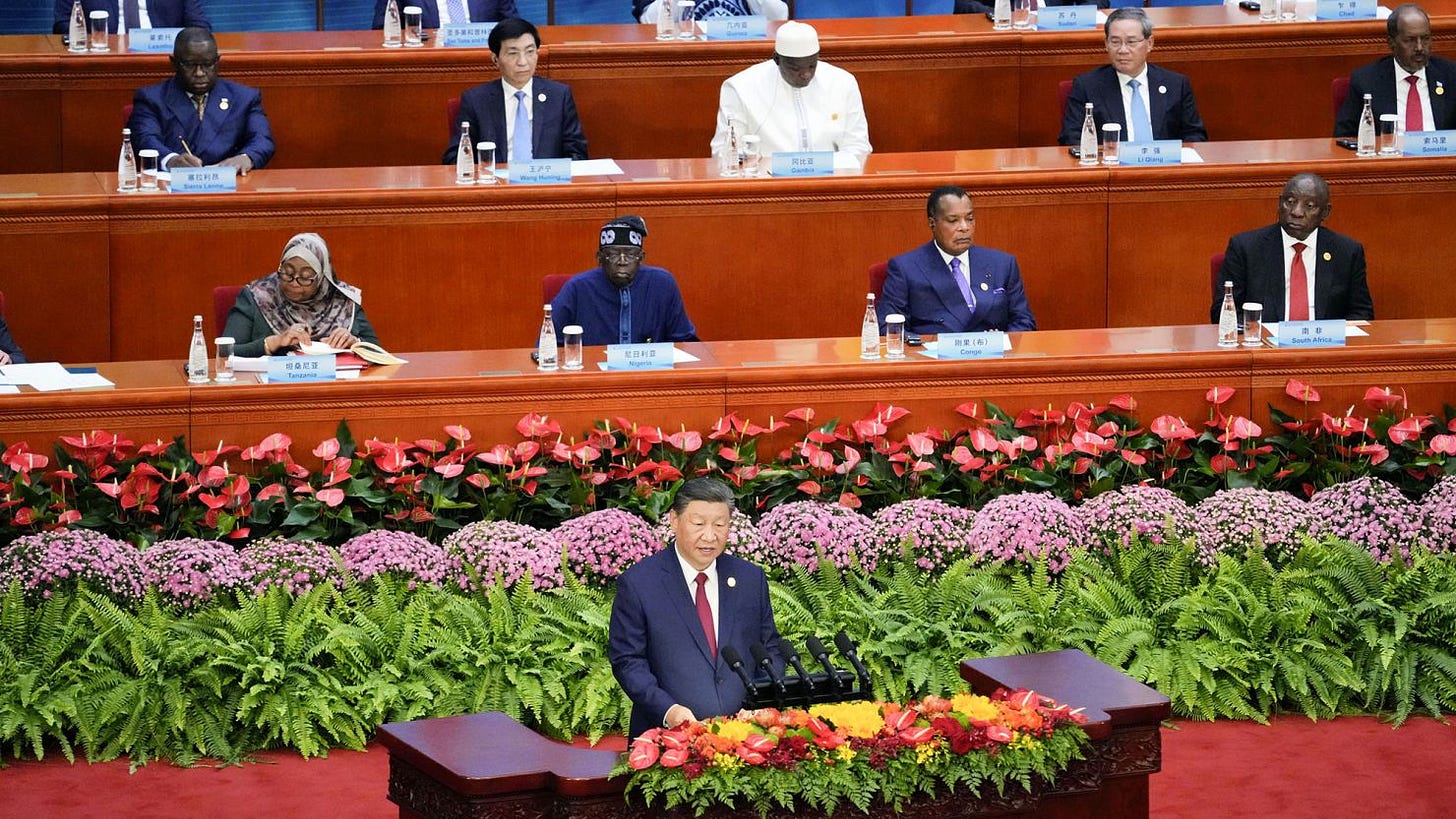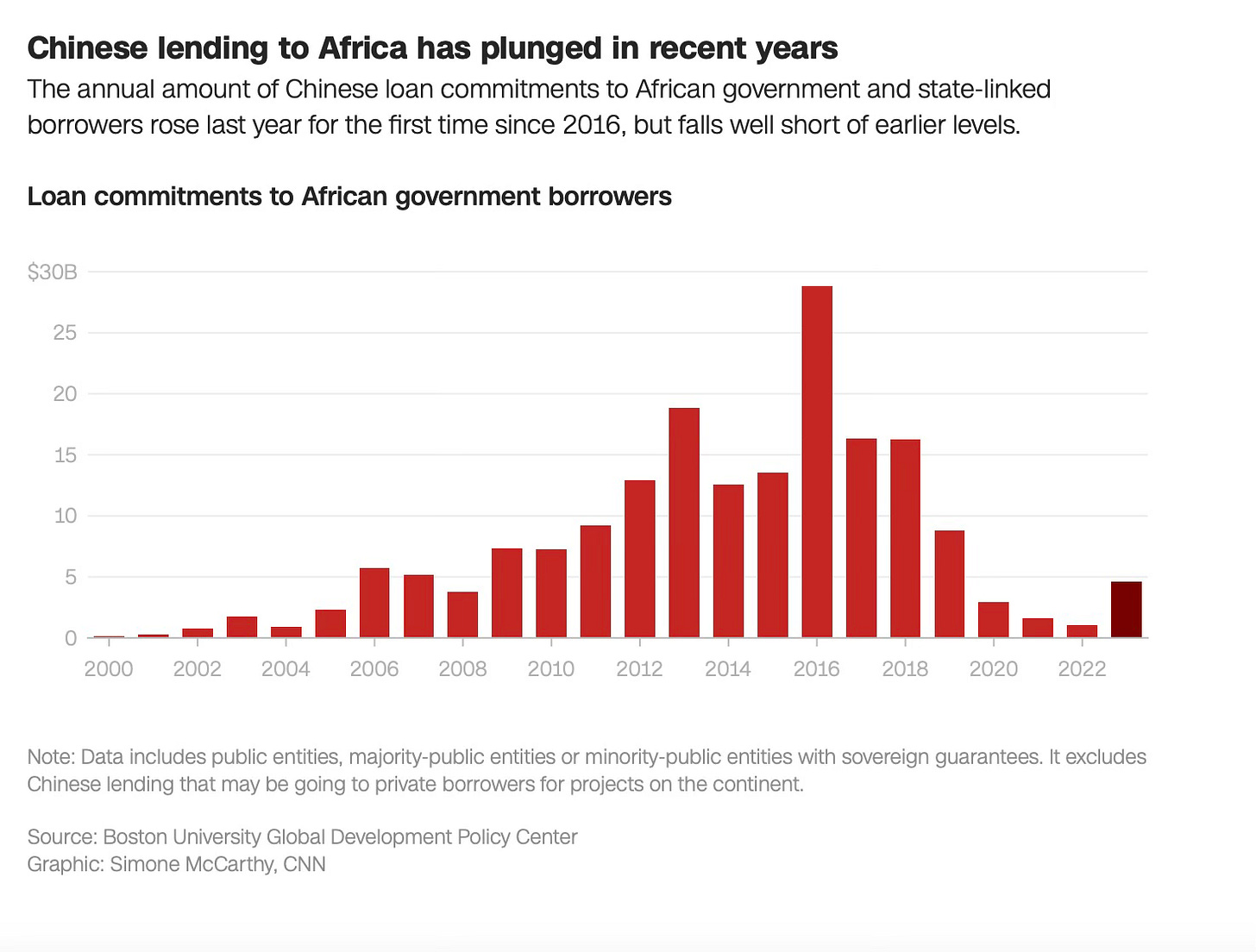While America still tries to figure out what its famous “pivot to Asia” really means other than thwarting China’s designs on global leadership, Xi remains committed to, and even busy in, his pivot to Africa. As I have long portrayed this weird standoff, this whole thing feels like closing the barn door after the horses have all left: We seek to contain China in East Asia while China is pushing its Belt and Road Initiative all over the world.
From my second, still-under-construction Massive Open Online Course (MOOC) that will extend my first (The Superpower Grand Strategies: Winning the Globalization Game):
Here’s the bad sale on our part: to deny China’s success going forward is to — by extension — do much the same to SE Asia (currently in its demographic dividend phase), S Asia (coming up strong), and ultimately Africa (the center of youth culture and consumption mid-century). Now, if we were offering a serious alternative to China’s development schemes, that would be different. But we’re mostly selling trade protectionism right now, and, whatever the faults of the Chinese model (and there are plenty), the Global South “choosing” us right now makes little-to-no sense.
We’re offering more of the same (or worse), and China’s offering a genuine way ahead — at the price of leaving the West’s patently-unfair-to-the-Global-South international economic order and submitting to integration in China’s less-unfair-Beijing-led-alternative-world-order.
Xi was selling big time at Beijing’s just-concluded African leaders summit (Xi Jinping had one message for dozens of visiting African leaders: choose China):
Xi Jinping had a clear aim as he hosted delegates from more than 50 African countries for a major summit in Beijing this week: proving beyond doubt that China is the continent’s premier foreign partner.
Xi’s got a good case for that argument: China is bringing development while America is bringing drones. This remains our classic difference: Beijing works from the ground up while we literally attack top-down. We believe we fix things by knocking off bad actors, and China believes that, by extending its BRI and associated social surveillance network offerings, it can create a reasonable mix of safety and development that, along with a strong security state apparatus, can prevent bad actors from arising in the first place.
Ours is thus a strategy of limited regret: risk little, kill some, hope things get better (Powell Doctrine in a godawful nutshell). It is cynical and lazy and earns its just rewards (like occasionally being kicked out of a country like Niger). What we signal with our approach is this: Don’t cause too much trouble no matter how bad things get down here!
When you set the bar that low, China wins by default.
The Chinese leader made his case with ceremony on Thursday when, flanked by dozens of African leaders and the UN secretary general in the Great Hall of the People, he vowed to elevate ties between China and the continent to an “all-weather community with a shared future” – a status that Beijing reserves for its staunchest diplomatic allies.
He also made a raft of promises to the continent, to be fulfilled over the next three years: more than $50 billion in financial support; the creation of one million jobs; tens of millions in food and military aid – while vowing to “deepen cooperation with Africa in industry, agriculture, infrastructure, trade and investment.”
China’s conundrum is this: its internal slowdown now naturally limits its largesse to places like Africa, so, what was once free-flowing money on big infrastructure projects is now significantly reduced and pivoting to renewable energy and other “green” schemes, allowing China to divert those products like solar panels, which it makes in abundance, from now protectionist Western markets to the Global South.
That growing sense of economic stagnation back home also makes Beijing more wary of providing sovereign debt relief to African nations that have gone into hock with China over past schemes.
China is also not seen by observers to be the main cause of African debt distress in most cases, with debt to its lenders making up a comparatively small portion of the continent’s overall public debt.
But the influx of Chinese loans increased the debt burden, and while Beijing has defended its lending practices and its efforts to ease debt repayment, observers suggest it has moved too slowly or been inflexible in cases helping countries that are heavily indebted to it get relief.
These realities – along with China’s own economic slowdown – are seen to have reduced its appetite for such lending.
If it strikes you as somewhat hypocritical for the West to complain about China’s “debt trap diplomacy” of today when we did so much more of the same in the past, then you have both a conscience and a sense of history. Because that past experience is still exploitable:
The Chinese leader reached back into history to paint the West as the driver of challenges both for China and for Africa – part of what observers say is Beijing’s effort to portray the continent as firmly on its side when it comes to its broader geopolitical rivalry with the US.
China, Africa and other developing nations have for decades “been endeavoring to redress the historical injustices” of Western modernization, Xi told visiting delegations, in an apparent allusion to colonialism and exploitative practices in centuries past.
Now, Xi predicted, China would, along with African countries, “set off a wave of modernization in the Global South.”
Analysts say Beijing sees the continent’s backing as crucial to Xi’s aim of positioning China as a champion of the Global South – and an alternative global leader to the US.
Playing up that backing was also a likely motivation behind China’s elevation of diplomatic ties with attending African countries to a “strategic” level and its designation of the “all-weather China-Africa community with a shared future for the new era,” observers say.
That’s a clever sale, alright, but it risks imperial overreach at a time when China’s economy continues to stall out on its long-time rise.
China laments ‘garbage time of history’ as economy comes off peak and growth model hits dead end, expert says
People in China are so discouraged about the economic outlook that many have taken to social media to call it the “garbage time of history,” referring to the end of NBA games when the result is settled and players go through the motions until time runs out.
Here we get to the heart of Xi and Beijing’s conundrum:
Keep reading with a 7-day free trial
Subscribe to Thomas P.M. Barnett’s Global Throughlines to keep reading this post and get 7 days of free access to the full post archives.



